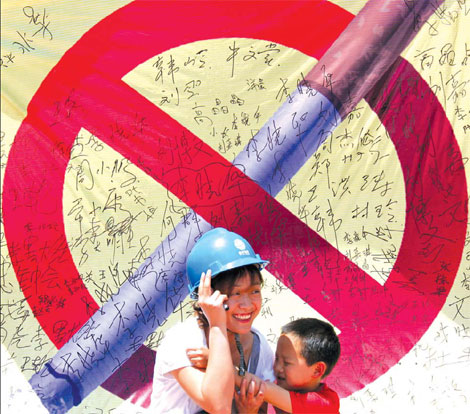Society
- Details
- By David Cao
- Hits: 1153
U.S. President Barack Obama and Chinese President Hu Jintao, seeking a steadier footing for the often-troubled U.S.-China relationship, played up the two nations' common interests—and soft-pedaled or ignored longstanding issues that divide them.
Their uneasy balance—neither friend nor foe—is emerging as the operating principle behind the globe's most critical bilateral relationship. In a one-hour press conference in the White House's East Room, the two leaders sought to demonstrate they can live with areas of tension, even if they can't cure them, including China's currency policy, its human-rights record and the nuclear ambitions of North Korea.
In private sessions, senior administration officials said, the two leaders addressed some of the countries' friction points: They spent about half their time discussing economic issues, and the rest on Iran, North Korea, human rights and other areas, aides said. President Obama's aides said that he pressed Mr. Hu more gently than Congressional critics did on letting China's currency rise, noting it has gradually risen 3.5%, and more if inflation is accounted for. "But he said that China needs to do more, needs to move faster," said a senior aide.
- Details
- By David Cao
- Hits: 895
 Police in central China's Henan Province say they have apprehended an official who has been been on the run for eight months after facing allegations of corruption.
Police in central China's Henan Province say they have apprehended an official who has been been on the run for eight months after facing allegations of corruption.
Li Weimin, 54, former vice secretary of the Anyang Municipal Committee of the Communist Party of China (CPC), disappeared in May last year, a spokesman for the Public Security Bureau of Anyang, Henan Province, said Wednesday.
Police apprehended Li on Monday in Sanmenxia, another city in Henan, the spokesman said, but he gave no further details about the detention.
Li's disappearance made headlines in Chinese media last year. He was expelled from the CPC in June for being suspected of having committed a count of crime known as "taking advantage of his position."
Although local authorities have given no details of his crime, media reports have linked him with a string of corruption cases revealed last year in Sanmenxia, where Li worked as a senior CPC and government official from 1998 to 2009.
Read more: Former Chinese official arrested after eight months on run
- Details
- By David Cao
- Hits: 1147

According to the Shenzhen traffic management department, the total number of cars in Shenzhen reached 1.7 million on December 8th, 2010. Shenzhen has become the number one city in China with high car density. The Shenzhen traffic management department estimates that Shenzhen’s maximum volume of motor vehicles will be 2.1 million according to the present number of roads in the city. That is to say that it is estimated that Shenzhen’s car number will reach its limitation in the next two years and it will be very difficult to drive.
- Details
- By David Cao
- Hits: 1847

China's pledge to ban smoking indoors looks set to go up in smoke as the Jan 9 deadline set five years ago approaches.
Despite the promise on entering the World Health Organization Framework Convention on Tobacco Control in 2006, The Beijing Times reported Tuesday that China has witnessed no decline in smoking, but has 200 million more people suffering from the effects of second hand smoke over the past three years.
A report named Tobacco Control and China's Future, which will be issued on Thursday, said 3 million deaths in China will be caused by smoking in 2030, accounting for 25 percent of the total, compared with 2 to 3 percent for AIDS.
The social welfare effect of the tobacco industry has also declined sharply from 150 million yuan ($23 million) in 1998 to minus 60 billion yuan in 2010, considering the high costs including medical and labor which far outnumbered its contribution of tax and employment, the report said.
- Details
- By David Cao
- Hits: 923

The annual death toll from tobacco-related illnesses in China could triple over the next two decades, health experts warned ahead of a deadline for the country to implement international commitments to curb smoking that activists say Beijing has failed to meet.
Chart revenue from taxes and sales by China's state-owned tobacco monopoly, and compare cigarette market sizes by retail value in China and the U.S.
In a report issued Thursday, a group of 60 Chinese public-health experts, officials and economists argued that state ownership of the tobacco industry continues to stymie real progress in fighting tobacco—despite the mounting health and financial costs.
"While the national government may know it has a problem, it still doesn't understand that the long-term costs of this problem outweigh the revenue pulled in from tobacco sales," said Zhao Ping, deputy director general of the Cancer Foundation of China, who contributed to the report. The report's authors also include Hu Angang, an economist at Tsinghua University in Beijing, and Yang Gonghuan, a deputy director of the Chinese Center for Disease Control and Prevention.
More Articles …
Page 115 of 255